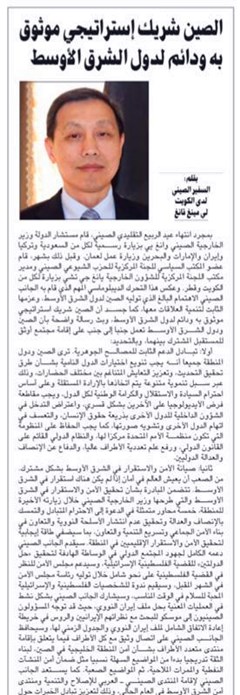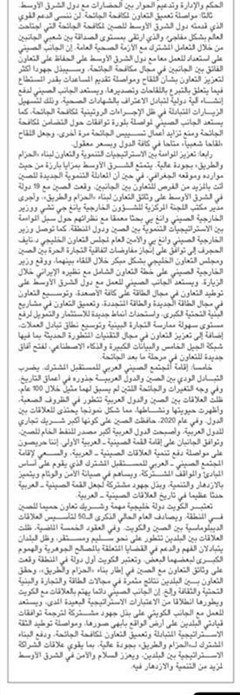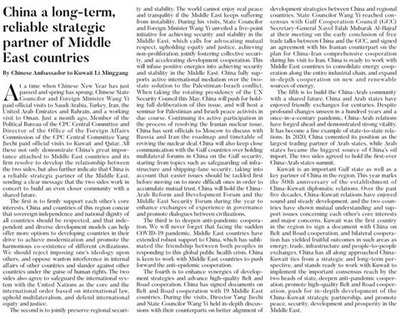On 8th April 2021, Ambassador Li Minggang contributed a signed article entitled "China a Long-term, Reliable Strategic Partner of Middle East Countries" to Kuwait's most widely circulated Arabic daily Al-Anba and English daily Kuwait Times, which elaborates the ideas and initiatives of China and Middle East countries on achieving regional peace, stability and development. Here is the full text of the article:
 |
 |
At a time when Chinese New Year has just passed and spring has sprung, Chinese State Councilor and Foreign Minister Wang Yi paid official visits to Saudi Arabia, Turkey, Iran, the United Arab Emirates and Bahrain, and a working visit to Oman. Just a month ago, Member of the Political Bureau of the CPC Central Committee and Director of the Office of the Foreign Affairs Commission of the CPC Central CommitteeYang Jiechipaid official visits to Kuwait and Qatar. All these not only demonstrate China's great importance attached to Middle East countries and its firm resolve to develop the relationship between the two sides, but also further indicate that China is a reliable strategic partner of the Middle East, sending a clear message that the two sides work in concert to build an even closer community with a shared future.
The first is to firmly support each other's core interests. China and countries of this region concur that sovereign independence and national dignity of all counties should be respected, and that independent and diverse development models can help offer more options to developing countries in their drive to achieve modernization and promote the harmonious co-existence of different civilizations. We should reject imposing one's ideology upon others, and oppose wanton interference in internal affairs of other countries and slanderagainst other countries under the guise of human rights. The two sides also agree to safeguard the international system with the United Nations as the core and the international order based on international law, uphold multilateralism, and defend international equity and justice.
The second is to jointly preserve regional security andstability.The world cannot enjoy real peace and tranquility if the Middle East keeps suffering from instability. During his visits, State Councilor and Foreign Minister Wang Yi unveiled a five-point initiative for achieving security and stability in the Middle East, which calls for advocating mutual respect, upholding equity and justice, achieving non-proliferation, jointly fostering collective security, and accelerating development cooperation. This will infuse positive energies into achieving security andstability in the Middle East. China fully supports active international mediation over the two-state solution to the Palestinian-Israeli conflict. When taking the rotating presidency of the UN Security Council in this May, China will push for holding full deliberation of this issue, and will host a seminar for Palestinian and Israeli peace activists in due course.Continuing its active participation in the process of resolving the Iranian nuclear issue, China has sent officials to Moscow to discuss with Russia and Iran the roadmap and timetable of reviving the nuclear deal.China will also keep close communication with the Gulf countries over holding multilateral forums in China on the Gulf security, starting from topics such as safeguarding oil infrastructure and shipping-lane security, taking into account that easier issues should be tackled first before moving on to more difficult ones in order to accumulate mutual trust. China will hold the China-Arab Reform and Development Forum and the Middle East Security Forum during the year to enhance exchanges of experience in governance and promote dialogues between civilizations.
The third is to deepen anti-pandemic cooperation. We will never forget that facing the sudden COVID-19 pandemic, Middle East countries have extended robust support to China, which has sublimated the friendship between both peoples in responding to this global public health crisis. China is keen to work with Middle East countries to push forward the anti-epidemic cooperation. Firstly, China will step up vaccine cooperation and continue to donate and export vaccines to the region to the best of its ability. Secondly, China will promote the establishment of an international mechanism for mutual recognition of health codes to facilitate personnel exchangesunder the background of normalization of epidemic prevention and control. Thirdly, China and Middle East countries will continue to build consensus on solidarity against the pandemic, prevent the politicization of pandemic from reemergence, and make the vaccines available and affordable to all countries.
The fourth is to enhance synergies of development strategies and advance high-quality Belt and Road cooperation. The Middle East has significant resource and location advantages, and China's new development pattern will bring about more opportunities for cooperation between both sides. China has signed documents on Belt and Road cooperation with 19 Middle East countries. During the visits, Director Yang Jiechi and State Councilor Wang Yi held in-depth discussions with their counterparts on better alignment of development strategies between China and regional countries. State Councilor Wang Yi reached consensuswith Gulf Cooperation Council (GCC) Secretary-General NayefFalah Mubarak Al-Hajraf at their meeting on the early conclusion of free trade talks between China and the GCC, and signed an agreement with his Iranian counterpart on the plan for China-Iran comprehensive cooperation during his visit to Iran. China is ready to work with Middle East countries to consolidate energy cooperation along the entire industrial chain, and expand in-depth cooperation on new and renewable sources of energy. Both sides will also work to deepen cooperation on contracting of major infrastructure projects, innovate investment models,promote trade facilitation, expand the scale of bilateral currency swaps, in addition to increasing high- and new-tech cooperation on 5G, big data and artificial intelligence, in order to shape new areas of growth for cooperation in the post-pandemic era.
The fifth is to build the China-Arab community with a shared future. China and Arab states have enjoyed friendly exchanges for centuries.Despite profound changes unseen in a hundred years and a once-in-a-century pandemic, China-Arab relations have forged ahead and demonstrated strong vitality. It has become a fine example of state-to-state relations. In 2020, China cemented its position as the largest trading partner of Arab states, while Arab states became the biggest source of China's oil import. The two sides agreed to hold the first-ever China-Arab states summit.We will continue to deepen China-Arab relations, take the building of a community with a shared future for China and Arab states as the lead, and work closely to make the aforementioned summit a memorable event in the history of China-Arab relations.
Kuwait is an important Gulf state as well as a key partner of China in the region. This year marks the 50th anniversary of the establishment of China-Kuwait diplomatic relations. Over the past five decades, China-Kuwait relations have enjoyed sound and steady development, and the two countries have shown mutual understanding and support issues concerning each other's core interests and major concerns. Kuwait was the first country in the region to sign a document with China on Belt and Road cooperation, and bilateral cooperation has yielded fruitful outcomes in such areas as energy, trade, infrastructure and people-to-people exchanges.China has all along approached China-Kuwait ties from a strategic and long-term perspective, and stands ready to work with Kuwait to implement the important consensus reach by the two heads of state, deepen anti-pandemic cooperation, promote high-quality Belt and Road cooperation, push for in-depth development of the China-Kuwait strategic partnership, and promote peace, security, development and prosperity in the Middle East.

